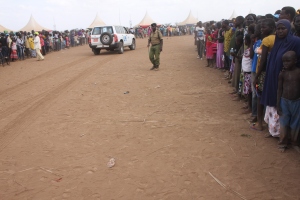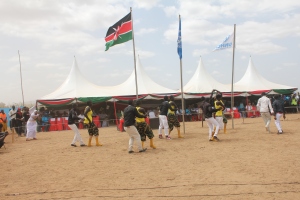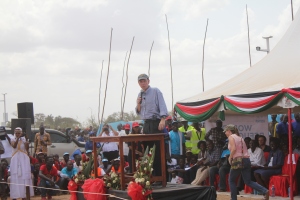Thousands of refugees in Kakuma and large numbers of humanitarian agencies showed up to commemorate the day with cultural dances.
In Kakuma the World Refugee Day – WRD – was commemorated on Friday 20 June. The annual event was honored in order to draw public attention to the plight of the millions of refugees worldwide who have been forced to flee their homes due to war, violent conflicts and persecution.
The day significantly reminds all the refugees and asylum seekers of the day they managed to cross hostile territories and unregulated borders in search of safety, protection and a chance in life. The theme for this year was the same as last year: “One family torn apart by war is too many“.

For the last 23 years since the establishment of Kakuma refugee camp, the WRD event has been observed at Napata grounds within the camp settlement. However, this year for the first time, the commemoration was held outside the perimeter of the camp, at Kalemchuch youth center. Refugees had trek for long distances to the venue while a large number of the camp residents did not show up.
However, there was nothing significant or unusual observed on the WRD despite the change of venue. During the event refugees eagerly waited with unfounded expectations and hopes for a future not living in limbo.
“We had much expectation of practical changes on food, protection and durable solutions which are not coming,” Waqo an Oromo Ethiopian supposed.

The eventful day was organized by UNHCR in conjunction with partner organizations and the refugee communities. The refugee communities were issued with separate tents according to different nationalities, in which diverse cultural performances were given. Some communities put up the flag of the country of origin where they fled from. While several humanitarian agencies showcased their work and services offered to the beneficiaries.
The speech by the Kenyan Cabinet Secretary was read by the chairman of the refugee council on behalf of Mr. Ole Lenku. The secretary confirmed that Kenya will uphold the international refugee laws and protect refugees. “The refugee status is not permanent but a short stay mandate. We’re asking the refugees (Somalis) to voluntarily register to go back home” was the message of Lenku’s speech.
According to the Ministry of Interior for Co-ordination of National Government, an estimated 200,000 Somali refugees are ready to go back home.
As normal, a wide range of activities were held at Kalemchuch. The refugee groups were invited to entertain guests with dances, narratives and music performances.
The colorful day was “celebrated” by the humanitarian aid agencies as marked by speeches of appeal regarding donor funding to the high profile guests present at the event. In attendance were US Ambassador Robert Godec, UK Ambassador Christian Turner, Ambassadors of Senegal, Japan and Uganda to Kenya. There were Government officials from the Ministry of Interior and Co-ordination of National Government, the County Commissioner for Turkana West among other distinguished guests.

“Today, we joined the international community and over 45 million people uprooted by war, conflict and persecution. It’s an international obligation for everyone to support refugees,” said Ambassador Godec.
According to Mr Godec, the US government has taken a leading role in support of refugees across the globe. In his speech, it was noted that 280,000 refugees have sought permanent resettlement to the US in the past couple of years while in 2013 his government donated 1 Billion US Dollars which is equivalent to 9 Billion Kenyan shilling in support of refugees globally.
“I was in South Africa in 2001 but this is the first refugee camp I have ever visited. We’ll stand with you in solidarity,” said the Japanese Ambassador H.E. Shigeo Iwatani.
According to the UK Ambassador Christian Turner, the UK government donated 10 million US Dollars in support of refugee operations for this year in Kenya. The ambassador advised UNHCR to be more proactive in safeguarding refugee rights with regard to the “Usalama Watch”. “We stand against forceful relocation and we’ll do our best to resettle more refugees from Kenya,” said Dr Turner.
On this day, many refugees in Kakuma had negative reflections on their unsuccessful life, long wait in dependency fostered by the camp structure. “I arrived in Kakuma in 1997, I was waiting but waiting for nothing, no change in waiting” said Mohamud, a Somali.
According to the UN Refugee Agency reports released on June 20, 51.2 Million people were forcefully displaced at the end of 2013, 6 Million more than the 45.2M reported in 2012.
While a long distance runner and peace activist, Tegla Lorupe who holds several world records, had some encouraging speech for the exile community. “We are appealing to donors for more support and continued protection of refugees in Kenya,” she said.
“The international community has to overcome its differences and find solutions to the conflicts of today in South Sudan, Syria, Central African Republic and elsewhere. Non-traditional donors need to step up alongside traditional donors. As many people are forcibly displaced today as the entire populations of medium-to-large countries such as Colombia or Spain, South Africa or South Korea,” said UNHCR Chief Antonio Guterres.
The biggest refugee populations under UNHCR care by source country are Afghans, Syrians and Somalis – counting for more than half of the refugee global total.
